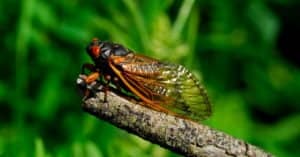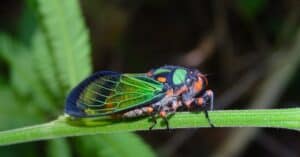Northern parts of Virginia are starting to see a phenomenon that has been 17 years in the making – the Brood X cicadas. For the last few weeks, sightings in many of the eastern states have been popping up on social media. These cicadas may seem a little intimidating with their red eyes and how closely they resemble locusts, but there’s no need to worry at all.
However, cicadas can be a noisy nuisance, as the males’ calls can be up to 120 decibels. After 17 years, the insects are coming out from underground to come out of their shells and reproduce before dying. They eat tree sap, and the females will lay eggs in the slits they cut in tree branches. Most healthy trees can withstand this process.
Virginia Tech Announces What to Expect
While the current pandemic may be leaving may people in a state of worry for the Brood X that they haven’t seen in recent history, they were actually here 17 years ago. The only difference? Social media wasn’t around in the same abundance for the public to post every single sighting as they emerge. While some areas are already seeing a lot of them, a tweet from Virginia Tech sheds light on the fact that there’s still a lot more to come.
The 17 year cicadas are Virginias longest-living insect, in fact, no other insect alive has such a life cycle. The ymphs from Brood X cicadas that emerged in 2021 won’t reappear until 2038. Which is basically four presidential elections. Most recently, Cicadas in Virginia appeared in 2013, and won’t be seen again until 2030.
According to the retweeted article from The Cut, the cicadas are primarily being released in areas that have already reached 64 degrees in their soil. Temperatures are starting to rise in the southern states, including Virginia. However, the surfacing of these insects has largely been in the northern area so far.
Northern Virginia’s Transportation Authority Chimes In
Northern Virginia’s Transportation Authority is already trying to get ahead of the challenges that the Brood X cicadas might bring in their large numbers. While many of the cicadas are currently found on fences and trees, the brood is expected to be in the trillions when they fully arrive. As large as they may be, there is no reason to swerve vehicles to dodge them. The Transportation Authority has already reminded the public to maintain their watchful eye to avoid potential collisions.
Page Valley News Reassures the Public
As intimidating as swarms may become, it is understandable that many locals are worried about what the insects will do to their crops. Luckily, as Page Valley News reports, Brood X cicadas aren’t really a threat to orchards across the state. An agent from Virginia Cooperative Extension in Hanover Country, Laura Maxey-Nay, even remarked that the insects could actually offer many benefits.
Based on her entomology background, Maxey-Nay stated, “Cicadas will only damage branches about the diameter of a pencil, so if anything, they offer a natural pruning process. Any healthy trees can withstand the damage.”
Since the cicadas are not expected to hit some regions of northern Virginia until later in the month, their loud “song” will likely alert anyone nearby. Gardeners that may have younger trees can protect them with a lightweight net, preventing Brood X cicadas from damaging the branches. Plan for a long cicada season – they will likely be here through the end of August.
Cicada Brood X News & Information
Brood X is currently (spring 2021) emerging on the east coast of the United States. More information and coverage can be found here!
- Cicadas in New York: What’s Happening Now?
- Cicadas in Pennsylvania: What’s Happening Now?
- Cicadas in Virginia: What’s Happening Now?
- Cicadas in Tennessee: What’s Happening Now?
- Cicadas in Washington, DC: What’s Happening Now?
- Cicadas in Maryland: What’s Happening Now?
- Here’s What 1.5 Million Cicadas Looks Like
- Will Cicadas Cause More Snakes? Copperheads?
- Can Dogs Eat Cicadas?
- Will Cicadas Eat My Tomato Plants?
- Cicada Brood X 2021: What is it and should you be concerned?
- Why Do Cicadas Only Come Out Every 17 Years?
- Cicadas vs Locusts: What’s The Difference?
Learn more about cicadas, including why they only come out every 17 years, the difference between cicadas and locusts, whether cicadas eat tomato plants and more. Click in the search box and type in “cicada.“
Next Up…
- What Do Stink Bugs Eat? – How do stink bugs eat? What do they eat? Are they harmful to people? Keep reading to find out!
- What Do Stick Bugs Eat? – Do stick bugs eat sticks? If not, what do they eat? Click to learn more!
- What Do Boxelder Bugs Eat? – What’s a boxelder bug and what do they eat? Not sure? Learn more now!
The photo featured at the top of this post is © Georgi Baird/Shutterstock.com
Thank you for reading! Have some feedback for us? Contact the AZ Animals editorial team.






